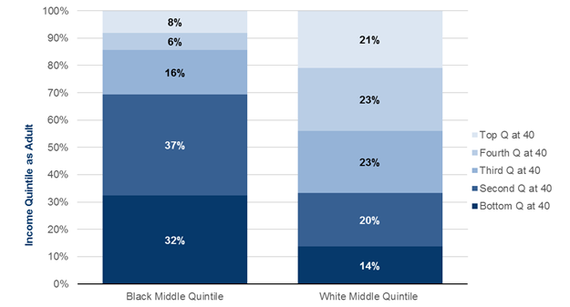General Discussion
Related: Editorials & Other Articles, Issue Forums, Alliance Forums, Region ForumsHow Black Middle-Class Kids Become Poor Adults
http://www.theatlantic.com/business/archive/2015/01/how-black-middle-class-kids-become-black-lower-class-adults/384613/ ?nihlsj
?nihlsj
When it comes to financial stability, black Americans are often in much more precarious financial situations than white Americans. Their unemployment rate is higher, and so is the level of poverty within the black community. In 2013, the poverty rate among white Americans was 9.6 percent, among black Americans it was 27.2 percent. And the gap between the wealth of white families and black families has widened to its highest levels since 1989, according to a 2014 study by Pew Research Center.
The facts of this rift aren’t new, or all that surprising. But perhaps what’s most unsettling about the current economic climate in black America is that when black families attain middle-class status, the likelihood that their children will remain there, or do better, isn’t high.

“Even black Americans who make it to the middle class are likely to see their kids fall down the ladder,” writes Richard Reeves, a senior fellow at the Brookings Institution. In a recent blog post Reeves says that seven out of 10 black children who are born to families with income that falls in the middle quintile of the income spectrum will find themselves with income that's one to two quintiles below their parents' during their own adulthood.
A 2014 study from the Federal Reserve Bank of Chicago, which looked at factors like parental income, education, and family structure, shows a similar pattern: Many black Americans not only fail to move up, but show an increased likelihood of backsliding. According to the study, “In recent decades, blacks have experienced substantially less upward intergenerational mobility and substantially more downward intergenerational mobility than whites.”
uponit7771
(90,335 posts)...sense
Igel
(35,300 posts)And weren't to produce a good answer.
A disproportionate number of middle-class African-American kids showed an achievement gap with their white peers as they hit middle school. This affected their grades and course selection in middle school and in high school, and consequently affected their college-readiness and college options when they graduated high school. They were often in the same school, same community, parents had similar levels of income and educational attainment, but their kids patterned more like the average for society. (Note I'm saying "more like," not "just like".) While I think considering college as a kind of vocational-technical school is a really bad idea, it remains true that a college education is a great help in being middle and upper-middle class in the US (or elsewhere).
All the researchers that adduced any explanation that didn't involve overt racism were heavily criticized. It's a problem in some disciplines--you have to justify the accepted answer.
Some ed psych folk pointed out that the kids showed this pattern at precisely the time when identity issues burst forth. (There are two forces here--both with the same effect, but the two sides typically only see and blame the one that they're not responsible for. One says, "You're like us, act like us" and the other says, "You're not like us, get away."![]()
Another factor is how colleges use black kids. Two studies made absolutely no impact on the discussion of affirmative action but should have. They occurred in parallel, each researcher acting in ignorance of the other. One looked at law schools, where it's clear that different law schools are more prestigious and rigorous than others. One at U. Calif. schools, where there's a clear tier system with Berkeley and UCLA being flagship, "best" schools and places like Riverside being tier 3 or low tier 2. Both researchers found the same thing. Metrics upon admission to school were predictive of average college success. If you were in the bottom 10% of admits, you had a high drop-out rate. If in the range 11-25%, you had a lower drop-out rate. Affirmative action in UC schools and in law schools tended to take African-Americans who would have been in the middle of the pack in tier 2 schools and elevated them into tier 1 schools where they were in the bottom 10-15%. Their drop-out rates were like that of whites in those tier 1 schools, but higher than their peers with the same metrics in tier 2 schools. Most of the tier 1 drop-outs had metrics like students who graduated with B averages from tier 2 schools, whatever their skin color. A.a. took blacks that would have been middle-of-the-pack in tier 3 schools and admitted them to tier 2 schools, where they were again in the bottom 10-15%, and had higher drop-out rates than their peers who tended to graduate with B averages from low tier 2 or from tier 3 schools. In other words, a.a. mismatched blacks to universities in a way that made the universities' diversity admit numbers look good but hurt the kids. Remediation and tutorial programs didn't remedy the problem.
We could talk about how the numbers being compared aren't comparable. In 1980, a far higher percentage of whites were middle class because they had jobs that required college degrees than did blacks. College-educated parents tend to have kids who are more likely to go to college. As high-paid manufacturing jobs went away, both trends would affect blacks more than whites. Black middle class families would be hit more by deindustrialization and less likely to send their kids to college.
There are also issues of accumulated wealth and the ability to send their kids to good schools (although I suspect that's a bit overstated until fairly recently--most of the kids I went to college with took out loans or mostly paid their own way, without that much money from their parents).
I suspect that a family's tradition of college also matters, but that's easily confused with other issues that people tend to think as primary (but might not be--one problem we all have is questioning our assumptions).